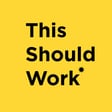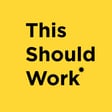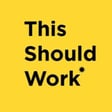
TSW* S1E7 - Zac Strobl - Northern Kentucky University
In this episode of *This Should Work*, we sit down with Zac Strobl, the newly appointed Director of the Center for Innovation and Entrepreneurship at Northern Kentucky University. With over a decade of experience in fostering student entrepreneurship through initiatives like the INKUBATOR, Zac shares his insights on the evolving landscape of innovation and the importance of practical, hands-on learning for aspiring entrepreneurs.
Join us as we explore:
- Zac's journey from student entrepreneur to director, including the pivotal moments that shaped his career.
- The mission and vision of the Center for Innovation and Entrepreneurship and how it supports students in launching their business ideas.
- The significance of mentorship and community engagement in building a robust entrepreneurial ecosystem.
- Strategies for nurturing creativity and problem-solving skills among students, preparing them for success in both startups and established companies.
- Exciting upcoming initiatives and events at NKU that aim to empower the next generation of innovators.
Whether you're a budding entrepreneur, an educator, or simply interested in the dynamics of innovation, this conversation with Zac Strobl is sure to inspire and inform. Tune in to discover how NKU is shaping the future of entrepreneurship!


